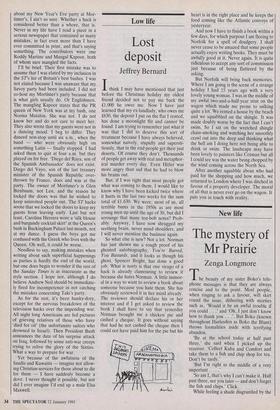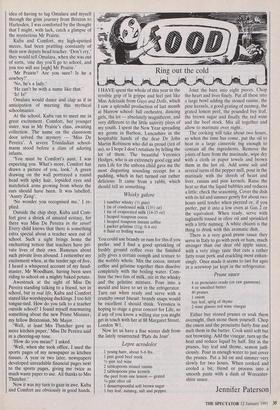New life
The mystery of Mr Prairie
Zenga Longmore
The beauty of my sister Boko's tele- phone messages is that they are always concise and to the point. Most people, when ringing to ask a favour, will skirt round the issue, dithering with niceties such as, 'Would it be an awful trouble if you could . . .' and 'Oh, I just don't know how to thank you . . .'. But Boko (known throughout Harlesden as Boko the Blunt) throws formalities aside with terrifying abandon.
`Be at the school today at half past three,' she said when I picked up the receiver. 'Collect Kuba and Comfort and take them to a fish and chip shop for tea. Don't be tardy.'
`But I'm right in the middle of a very important . . . .'
`So am I, that's why I can't make it. Half past three, see you later — and don't forget the fish and chips.' Click.
While feeling a shade disgruntled by the idea of having to lug Omalara and myself through the grim journey from Brixton to Harlesden, I was comforted by the thought that I might, with luck, catch a glimpse of the mysterious Mr Prairie.
Kuba and Comfort, my high-spirited nieces, had been prattling constantly of their new deputy head teacher. 'Don't cry,' they would tell Omalara, when she was out of sorts, 'one day you'll go to school, and you too will see [sigh] Mr Prairie.'
`Mr Prairie? Are you sure? Is he a cowboy?'
`No, he's a lady.'
`He can't be with a name like that.'
`Is! Is!'
Omalara would dance and clap as if in anticipation of meeting this mythical schoolmaster.
At the school, Kuba ran to meet me in great excitement. Comfort, her younger sister, was in Mr Prairie's class, awaiting collection. The name on the classroom door solved the mystery — 'Miss De Pereira'. A severe Trinidadian school- marm stood before a class of adoring infants.
`You must be Comfort's aunt. I was expecting you. What's more, Comfort has drawn a picture of you, look.' A green drawing on the wall portrayed a round head with spiky hair, lopsided eyes and matchstick arms growing from where the ears should have been. It was labelled, `Aunty Zeng'.
`No wonder you recognised me,' I re- plied.
Outside the chip shop, Kuba and Com- fort gave a shriek of amazed ecstasy, for there was Miss De Pereira in the street! Every child knows that there is something extra special about a teacher seen out of school. Such a sight brings home the enchanting notion that teachers have pri- vate lives of their own. Rumours about such private lives abound. I remember my excitement when, at the tender age of five, I heard a whispered account of my head- master, Mr Woodham, having been seen riding to school on a mighty baked potato.
Awestruck at the sight of Miss De Pereira standing talking to a friend, not in school, but in real life, Kuba and Comfort stared like worshipping ducklings. I too felt tongue-tied. How do you talk to a teacher outside school? I found myself murmuring something about the new Prime Minister, my fellow Brixtonian, Mr Major.
`Well, at least Mrs Thatcher gave us more kitchen paper,' Miss De Pereira said in a cheering-up tone.
`How do you mean?' I asked.
`Well, when she took office, I used the sports pages of my newspaper as kitchen tissues. A year or two later, newspapers developed unreadable financial pages next to the sports pages, giving me twice as much waste paper to use. All thanks to Mrs Thatcher.'
Now it was my turn to gaze in awe. Kuba and Comfort are obviously in good hands.











































 Previous page
Previous page